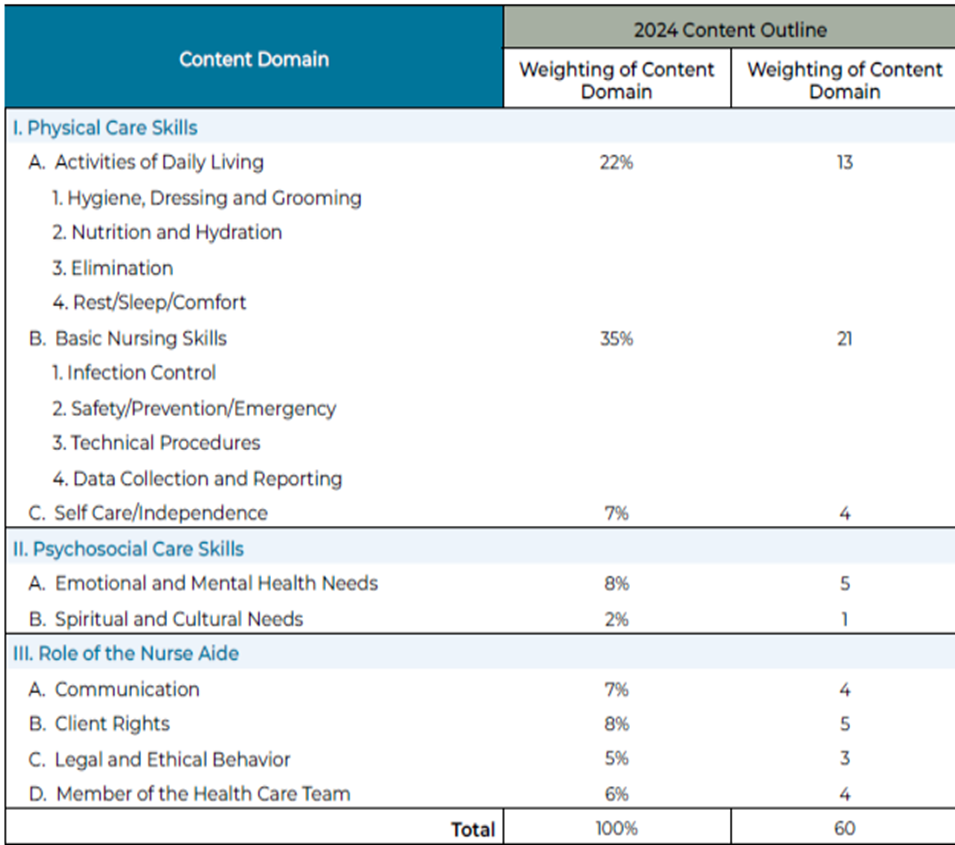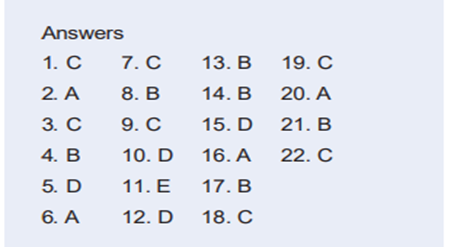The Written (or Oral) Exam
You can choose either written or oral exam.
Written Exam
The Written Examination has seventy (70) multiple choice questions. You will have two (2) hours to complete the Written Examination. See Sample Questions for examples of the kinds of questions found on the Written Examination.
Oral Exam
An Oral Examination may be taken in place of the Written Examination. You must request an Oral Examination when filling out your application.
The Oral Examination consists of two (2) parts, and you must pass both parts to pass the Oral Examination. When taking the online proctored exam, you will need your own wired headset. The first part of the Oral Examination has sixty (60) multiple-choice questions. Each of the sixty (60) multiple choice questions is read twice. As each question is read, you are asked to choose the correct answer.
The second part of the Oral Examination has ten (10) multiple-choice questions that test whether you know common words used in long-term care facilities. Each word is read three (3) times. You are asked to match the word you hear on the recording to the written word on the computer screen.
Self-Assessment Reading Test
A self-assessment reading test, see Self-Assessment Reading Test Sample Question, will help you decide if you should take the Oral Examination.
Content Outline
The revised content outline is based on the findings from the 2019–2020 Job Analysis and Knowledge, Skill, and Ability Study of Nurse Aides published by the National Council of State Boards of Nursing (NCSBN) in 2023. The examination content outline will be effective April 2024.
The NNAAP® written examination is comprised of seventy (70) multiple-choice items; ten (10) of these items are pretest (non-scored) items on which statistical information will be collected. The NNAAP® oral examination is comprised of sixty (60) multiple-choice items and ten (10) reading comprehension (word recognition) items.
Sample Question
The following questions are samples of the kinds of questions that you will find on the Written Examination. Check your answers to these questions in the box below.
1. The client’s call light should always be placed:
- on the bed
- within the client’s reach
- on the client’s right side
- over the side rail
2. Which of the following items is used in the prevention and treatment of bedsores or pressure sores?
- rubber sheet
- air mattress
- emesis basin
- restraint
3. When caring for a dying client, the Nurse Aide should:
- keep the client’s room dark and quiet
- allow client to express his feelings
- change the subject if client talks about death
- contact the client’s minister, priest or rabbi
4. What does the abbreviation ADL mean?
- Ad Lib
- As Doctor Likes
- Activities of Daily Living
- After Daylight
5. After giving a client a back rub, the Nurse Aide should always note:
- the last time the client had a back rub
- any change in the client’s skin
- client’s weight
- amount of lotion used
6. How should the Nurse Aide communicate with a client who has a hearing loss?
- face the client when speaking
- repeat the statement
- shout so that the client can hear
- use a high-pitched voice
Correct Answers
| 1.B 2. B 3.B 4.C 5.B 6. A |
Self-Assessment Reading Test Sample Question
The two (2)-part Self-Assessment Reading Test that appears below will help you decide if you should consider taking the Oral Examination instead of the Written Examination. To complete the reading test, follow the instructions provided below and select the answer to each question. When you have completed the reading test, you will be able to determine the number of questions you answered correctly.
Part 1: Vocabulary
Important Note:
- Circle the best answer to each question.
- When you have finished, check your answers using the answer key on page.
- Count the number of correct answers.
- If your score is less than seventeen (17), you may have difficulty reading the Written Examination and should consider taking the Oral Examination.
1. You go to a doctor when you _______.
- feel sleepy
- need socks
- feel sick
- need money
- need clothes
2. A person who flies an airplane is _______.
- pilot
- steward
- mother
- surgeon
- director
3. You use a _______ to write.
- bow
- calculator
- pencil
- carpenter
- needle
4. To exit a room means to_______ it.
- enter
- leave
- forget
- read
- interrupt
5. A wedding is joyous _______.
- focus
- vehicle
- balloon
- occasion
- civilization
6. To require something means to _______ it.
- need
- have
- forget
- understand
- hear
7. You _______ something to find its length.
- slice
- lock
- measure
- force
- tape
8. Soup is served in a _______.
- plate
- bowl
- fork
- chair
- closet
9. To accompany someone means to _______.
- disagree with him
- work for him
- go with him
- speak to him
- choose him
10. A nursing home resident receives _______ from the staff.
- quality
- fame
- interruption
- care
- work
11. Medicine is used to _______ pain.
- widen
- conjure
- enliven
- increase
- relieve
12. To drench the flowers means to _______ them.
- steam
- drink
- touch
- soak
- anger
13. A bicycle is a means of _______.
- nourishment
- transportation
- prediction
- collision
- walking
14. When someone speaks in a whisper, it may be difficult to _______.
- deceive
- understand
- frighten
- estimate
- regulate
Part 2: Comprehension
In this part of the reading test, you will be provided with a series of brief paragraphs. You will read each paragraph and then answer the questions that appear after the paragraph.
There are many kinds of fish. All fish live in water. They use their tails and fins to swim.
15. Fish live in _______.
- cups
- houses
- air
- water
- fountains
16. Fish use their _______ to swim.
- tails
- heads
- gills
- lungs
- float
Maria grew up on a farm. She loved the work on the farm. She knew when all the crops had to be planted. She would like a job on a farm or in a flower garden.
17. Maria has had experience as a _______.
- guide
- farmer
- driver
- nurse
- teacher
18. She would like to work in _______.
- an office
- a library
- a garden
- a hospital
- a supermarket
19. As a child Maria lived _______.
- in the city
- in an apartment
- on a farm
- in a large house
- on the beach
Carolyn has a good job. She is a nurse in a large hospital. Every day she can help many people. She enjoys this very much. She also makes a good salary. Each month she can pay her bills and save some money.
20. Carolyn works in a _______.
- hospital
- doctor’s office
- garage
- school
- library
21. One of the things Carolyn enjoys is _______.
- working in an office
- helping people
- reading books
- working late hours
- driving a car
22. With her salary she can pay her bills and _______.
- buy furniture
- give to charity
- save money
- buy new clothes
- pay for college
This completes the Self-Assessment Reading Test.
Note: If your score is less than seventeen (17), you may have difficulty reading the Written Examination and should consider taking the Oral Examination in place of the Written Examination.


